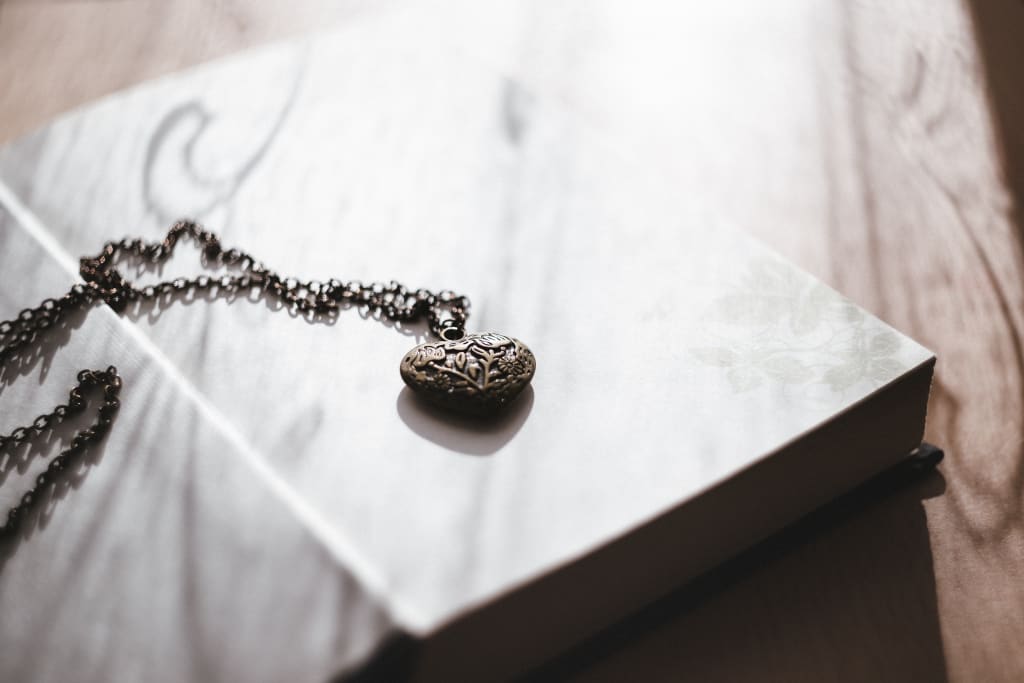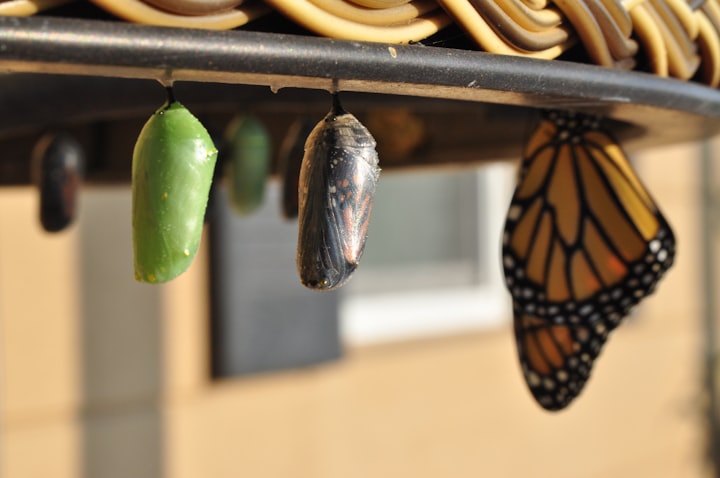“What the Dead Man Said”
Read a new short story about climate change, migration, and family secrets.


My father certainly fulfilled his filial duty. He became a ranger, protecting the bio-engineered species his parents had introduced in the forests they’d prepared. As his only child, I should have done the same. I’d always liked working with the soil, so it was expected that I would go into agroecology and grow the food that would feed our people. But after what happened with my uncle … I shook my head to ward off the memory.
As the bus pulled up in front of the family home at 142 Old Hospital Rd., I came out of my reverie and noticed that the rain had stopped. The house hadn’t changed since I’d last seen it three decades ago. Hell, it probably hadn’t changed in the 200 years since it had been built in the 1920s. It was a U-shaped complex with a central bungalow flanked by two-story apartments, one on either side. An open courtyard carpeted with moss grass, fruit trees, and wildflowers filled the space between them. My grandparents had reinforced its walls with permacrete and upgraded its interior to 22nd-century standards, but that’s where the improvements ended. After they died, the house went to my father, who’d never had much interest in technology. In the 20 years he’d lived there, he’d done nothing more than charge its batteries and replace burned-out solar cells.
Traditionally, the oldest members of the family would occupy the bungalow while their children and extended family members crammed into the two warrens of flats. If we’d restricted the apartments to blood family only, as some still did, those buildings would have stood empty. These days relatives were defined less by who’d slept with whom, and more by whose interests and personalities meshed best. I recalled the boisterous couples and polycules who’d lived in the building when I was young—all of them my cousins and uncles and aunties even though we had only marginal blood relationships to each other. The compound was abuzz with people. Someone had set up a canopy in one corner of the open field where my friends and I had played virtual sports as children. From somewhere in the back the delicate smell of Aba rice and goat stew wafted out, making my mouth water. The building’s families had spared no expense for this event. I tried to slip in quietly, but I was immediately spotted.
“Azuka! Is that you?” screamed a voice from somewhere in the crowd. It was Auntie Chio, a close friend of my grandmother who’d lived in the building for as long as I could remember. I’d been best friends with her two granddaughters, both of whom now lived in the Eko Atlantic megacity. She was one of the few adults who’d kept in touch with me after my mother and I moved to Turtle Island. I spotted her lithe frame dressed in her usual motley of clashing ankara fabrics as she swept out from the main bungalow. Her unlined face spoke nothing of her nearly 90 years, and before I knew it I was surrounded in her crushing embrace.
I smiled wanly. “Good evening, auntie.”
“Ah-ah, when did you come?” She held me at arm’s length, taking me in from head to toe, her eagle-eyed gaze missing nothing.
“Just now. I had to finish some work before I could travel.”
She nodded and gave me a look that was skeptical but sympathetic. She opened her mouth to say more, but her cry had attracted others and soon I was surrounded by people. Azu-nne, welcome! See how big you’ve grown, eh! So tall!”
“Come, you don’t remember me, do you? You were so small when last I saw you.”
“My condolences, my dear. It is well with you.”
I tried to respond to each comment and query with as many smiles and few words as possible, and soon I was ushered into the main house. It wasn’t until later that I realized one thing in the compound had changed: The small guardhouse that used to sit just inside the front gate was gone.
That evening at the wake-keeping, Auntie Chio and I sat in the living room next to the biodegradable pod where my father’s body lay, its feet facing the entryway. Earlier, she’d welcomed the community into the home as tradition dictated, presenting kola nuts and palm wine as an offering to the household gods. Another of my elder aunts—I forget how we’re related—led the prayers, pouring libation to beckon the ancestral spirits into our home and escort my father’s spirit to the land of the dead. This was the night of mourning and I wished I was somewhere, anywhere, else. But as my father’s only biological child, I had to stay by his body and receive mourners until dawn. Then, a government representative would show up to sound an ogene and officially alert the neighborhood of the death. The body would then be interred with its own tree in the front compound. My grandfather told me that when he’d visit Onitsha as a child, this alert would be done by gunshot. After New Biafra banned guns at the turn of the 2140s, we turned to gongs—something he’d much preferred.
It was one of the many stories my grandparents told me about why they chose to return to Onitsha from Turtle Island, after Old New York drowned in the Catastrophe. As a child, I often joined my grandparents—Mama and Papa, as I called them—when they sat trading memories on the veranda at twilight. I would climb into my grandmother’s lap and lean into her chest, savoring the vibrations of her voice as she spoke. “It’s a shame your father never got to see any grandchild from you.” My Auntie Chio’s voice jolted me into the present. “But we are glad that we will see them on his behalf, now that you have come home.”
I looked askance at her but said nothing. I didn’t need to be reminded that I’d failed to birth our family’s next generation. She must have caught something in my look because her voice dropped to a reassuring register. “You don’t have to marry anyone: We can get a surrogate, if you like. There’s even a government program that could help.”
“Auntie, is this really the best time to talk about this?”
“But of course! The ending of one life is the beginning of the next.” She shifted to face me, and I couldn’t avoid her intense gaze. “My dear, have you forgotten our saying: ‘To have a child is to have treasure’? That is more important today than ever before. “Look at our history. If it wasn’t for our children, how would we have survived the Civil War, when Nigeria wanted to see us all dead? And those in the western lands who laughed at us when they stopped having even one child after the Catastrophe, look at them now. Are they not the ones scooping us up to feed their hungry economies? Just look at the brokers who helped you and your mother resettle in the West—what didn’t they offer you to come? They have always known the value of our bodies. Before, they packed us away by force in the bottoms of slave ships, now they lure us with sweet songs of success.
“Azuka, do you know how quickly a people can disappear if they fail to value their children? It does not take centuries. Your grandparents understood this—that’s why we all came home. We wanted to bring our wealth back where it would do the most good. You are part of our legacy.” I broke away from her gaze, a wave of grief welling up in my chest. How could I tell her that my father’s line would die with me because I still recoiled at any sort of sexual contact? Or that the thought of having a child sent me into a paroxysm of panic because I was convinced that what had happened to me would also happen to them? My grief began to curdle into anger. No. This was no longer my legacy. A family that had essentially abandoned me when I needed them most did not get to decide what I did with my life.
Auntie Chio reached out and placed a gentle hand under my chin, lifting my head up to hers. “I will be honest with you, I never thought I would see you again—not after what happened. But I am glad you have come home, and I hope, for all our sakes, that you will find it in your heart to stay.” With that, she got up and left, leaving me alone with my thoughts. I sighed, my anger dissipating as quickly as it had come. After we moved, my mother turned her back on Onitsha—and all of New Biafra by extension—with a certainty that never wavered. As far as I know, she never spoke with anyone from my father’s side of the family ever again. I hadn’t been able to do the same, even though I had more cause than anyone to shake the red dust of this city from my feet.
My mother had scoffed when I told her I was coming down for the funeral. I hadn’t returned when my grandparents died, why was this burial so much more important? I couldn’t explain it. I’d always felt that I left New Biafra before I could take up my true purpose. That my life in Tkaronto was a shadow of what it could be. Perhaps I’d returned to bury more than my father. I looked up and two women I’d never seen before were leaning into the pod, wailing and calling the dead man’s name, asking rhetorically why he had left them. I wondered how much of their performance was obscure cultural theater and how much was genuine grief.
Their wailing increased, and I wished I’d been allowed to bring my A.I. That, however, would have been considered an insult to the body, like looking into the eyes of an elder while you were being scolded. I’d forgotten how quickly my people whitewash the truth about our dead. We fear that speaking ill of them will invite death on ourselves as well.
One of the women stopped in front of me, sniffling into an old cloth kerchief. She looked to be in her mid-40s—about my age. I looked up and two women I’d never seen before were leaning into the pod, wailing and calling the dead man’s name, asking rhetorically why he had left them. I wondered how much of their performance was obscure cultural theater and how much was genuine grief.
Their wailing increased, and I wished I’d been allowed to bring my A.I. That, however, would have been considered an insult to the body, like looking into the eyes of an elder while you were being scolded. I’d forgotten how quickly my people whitewash the truth about our dead. We fear that speaking ill of them will invite death on ourselves as well.
One of the women stopped in front of me, sniffling into an old cloth kerchief. She looked to be in her mid-40s—about my age. “Your father was a good man,” she said, reaching for my hands. I slid them into my pockets, just out of her reach, and she made do with patting my leg.
“Was he?” I tried for a tone of genuine curiosity, not the cynicism I actually felt.
“I wouldn’t be here today, if it wasn’t for him.”
I nodded, unsure of what to say. My father had been famously generous: Everyone I’d met so far had a story of how he’d stepped in at just the right moment to change their lives. I didn’t know what to do with these tales. I suppose it was easier to give money to strangers than to give of yourself to the people closest to you. After an awkward pause, she continued, speaking quickly as if to get the words out before her courage failed her. “You know, after I was raped 10 years ago, nobody wanted to help me.” I stiffened, tightening my hands into fists in my pockets. “Not my family, not the government, nobody. Only your father. He brought me into this house and allowed me to stay here for free until I found a place. He even paid for my marriage and my son’s apprenticeship. Me and my wife, we’re just so grateful to him.”
She pointed to the other woman, who had gone to stand by the door with a child of about 10 years. He had soft brown eyes and a head of unruly curls, and he wore a miniature version of the ranger’s uniform that the dead man in the pod was wearing. I didn’t tell her about the same dead man’s reaction to my own rape 33 years ago—23 years before her own. Instead, I smiled tightly. “I’m glad that it turned out so well for you.”
That’s when I saw the dead man’s shadow materialize in the corner of the room. I didn’t tell her about that, either.
The dead man appeared again sometime during the night.
I had just struggled out of a dream. I was back in the guardhouse, its small high windows streaming an uncertain gray light into the room. Then, hundreds of disembodied hands reached out of the ground to grab at me. They held me down, their fingers clutching, probing, and rubbing. I bit and clawed and slashed, but for every hand whose finger I tore off, for every palm I gouged and wounded, a new hand sprang up in its place. It was an old nightmare, one I hadn’t had in over 30 years. When we moved to Turtle Island, my mother and our relocation broker made sure I received all the necessary therapies to deal with my trauma, but being here where it all happened seemed to have dredged everything back up.
I lay on the living room couch drenched in sweat and blinked into the semi-darkness before I saw him sitting on the armrest by my feet. In the light of the bioluminescent trees that lined the street by the back window, he looked real enough. When I sat up and turned on the lights, he was gone.
I should have been frightened, but I wasn’t. I knew he’d show up again. He and I had unfinished business. He returned the next morning as I sat beneath the neem tree in the back garden, trying to hide from the unrelenting regard of the crowd of mourners inside the main house. The body was due to be interred with its tree in the front compound, and the place was choked with well-wishers.
They spilled out onto the walkway beyond the house’s hedgerow fence and into the road. I was agitated, but instead of tuning into the nature sounds queued up on my A.I., I listened to the weaver birds screeching to each other in the branches above me.
I never noticed how loud those birds are.
The dead man looked up at the tree’s slim branches, weighed down by the birds’ basket-like nests. This time, I decided to respond directly. “You never did notice much beyond your own interests.”
I expected him to come back with an attack that cut to my deepest insecurities. It was a talent he had, and he had often used it to great effect when he was alive, but he didn’t. He just nodded sadly and put his hands in his pockets.
I suppose I deserve that.
I would have to make do with that. Even in death, he couldn’t apologize. A group of three men around the dead man’s age filtered out onto the back veranda. They joked nervously with each other, as if their laughter would somehow keep the shadow of death from falling on them too. Two of them, both dressed in the dark high-collared tunics of Biafran government salarymen, discussed the finer points of spiritual salvation in Yoruba-inflected Igbo. I itched for something to read.
About the Creator
Jaramie Kinsey
COLOSSIANS 3:23
And whatsoever ye do, do it heartily, as to the Lord and not unto men






Comments
There are no comments for this story
Be the first to respond and start the conversation.